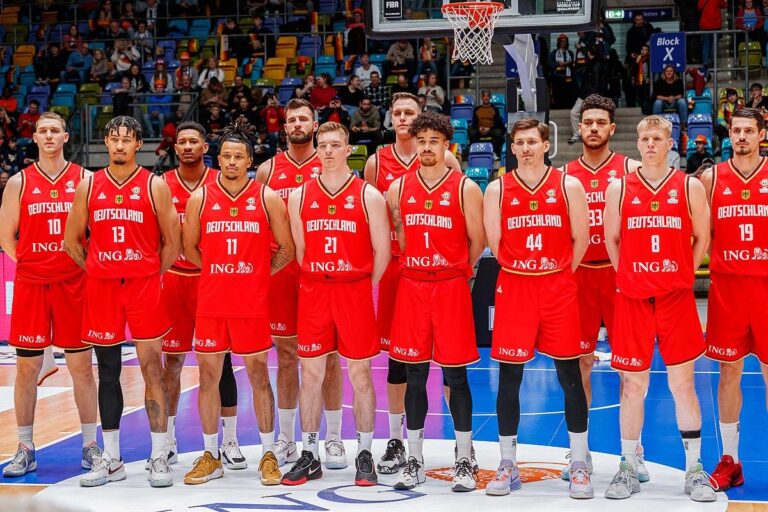In a thrilling display of skill and determination at the latest FIBA basketball tournament, Germany edged past Türkiye in a hard-fought contest, while Lithuania capitalized on the absence of Luka Dončić to dominate Slovenia. The closely contested encounters highlighted the depth and resilience of European basketball powerhouses, as teams vied for crucial positioning in the championship. This report delves into the key moments and standout performances that shaped these pivotal matches.
Germany Secure Hard-Fought Victory Over TĂĽrkiye with Resilient Defense
In a clash defined by strategic grit and tenacity, Germany emerged victorious against TĂĽrkiye after a fiercely contested battle on the court. The game saw both teams exchanging leads, but it was Germany’s impenetrable defense that ultimately dictated the pace and outcome. Key players stepped up under pressure, disrupting TĂĽrkiye’s offensive flow and forcing turnovers at critical moments. This defensive resilience not only stifled TĂĽrkiye’s scoring runs but also ignited fast-break opportunities that proved decisive in the final quarter.
Germany’s balanced approach was highlighted by a combination of veteran leadership and youthful energy. Notable contributors included the forward duo, who combined for 35 points and several pivotal rebounds. Meanwhile, TĂĽrkiye struggled to find consistent rhythm in their shooting, handicapped by Germany’s relentless defensive rotations. The competitive edge was visible in their ability to adapt and manage the game tempo, particularly in transition defense. Below is a snapshot of the key statistics that influenced the final outcome:
| Team | Points | Turnovers Forced | Defensive Rebounds |
|---|---|---|---|
| Germany | 78 | 15 | 34 |
| TĂĽrkiye | 72 | 9 | 27 |
- Germany’s defensive discipline limited TĂĽrkiye’s second-chance points.
- Crucial blocks and steals shifted momentum during decisive stretches.
- Effective team communication allowed Germany to contain TĂĽrkiye’s key scorers.
Lithuania Capitalize on Doncic Absence to Dominate Slovenia’s Offense
Lithuania seized a crucial opportunity on the court, exploiting the absence of Luka DonÄŤić to dismantle Slovenia’s offensive rhythm. Without their star playmaker, Slovenia struggled to find cohesive ball movement, allowing the Lithuanians to implement a stifling defensive scheme that pressured every pass and limited second-chance points. Key contributors like Mantas Kalnietis and Domantas Sabonis stepped up, combining their sharpshooting and playmaking prowess to keep the scoreboard ticking and force Slovenia into rushed shots and turnovers.
Slovenia’s reliance on DonÄŤić was glaringly evident as their secondary scorers failed to fill the void. Lithuania’s balanced approach, supported by aggressive rebounding and fast-break execution, underscored their tactical preparation and depth. The matchup stats reveal:
| Team | FG % | Turnovers | Rebounds | Points in the Paint |
|---|---|---|---|---|
| Lithuania | 48.7% | 9 | 42 | 38 |
| Slovenia | 39.2% | 16 | 29 | 24 |
Impact players for Lithuania included:
- Mantas Kalnietis – orchestrated the offense with poise, delivering 8 assists
- Domantas Sabonis – dominated the boards and contributed 20 points
- Arnas ButkeviÄŤius – nailed several key three-pointers to stretch the defense
Strategic Adjustments and Key Player Contributions Shape Outcomes in FIBA Showdowns
Germany’s narrow victory over TĂĽrkiye was a testament to tactical ingenuity and crucial individual performances. Adjusting their defensive schemes mid-game, Germany managed to stifle the typically high-octane TĂĽrk offense, forcing turnovers at pivotal moments. Key contributors like Dennis Schröder rose to the occasion, delivering crucial baskets and assists that tilted the momentum. The German coaching staff’s decision to deploy a more aggressive pick-and-roll defense disrupted TĂĽrkiye’s rhythm, showcasing how strategic shifts can influence outcomes in tightly-contested matchups.
Meanwhile, Lithuania capitalized on Slovenia’s absence of Luka Doncic by implementing a high-pressure offensive approach, overwhelming the Slovenian roster. The Litvinians’ balanced scoring, led by sharpshooters and versatile forwards, created multiple scoring avenues. Notably, Mindaugas Kuzminskas spearheaded the offense, exploiting mismatches and maintaining consistent scoring runs. Their ability to adapt offensively was complemented by a disciplined defensive framework that limited Slovenia’s opportunities to bounce back, emphasizing how resourceful adjustments and standout player contributions define success on the international stage.
- Germany’s defensive shift forced 15 turnovers in the second half.
- Dennis Schröder led with 22 points and 7 assists.
- Lithuania achieved 50% shooting accuracy from beyond the arc.
- Mindaugas Kuzminskas scored 18 points with 5 rebounds.
| Team | Turnovers Forced | 3PT Shooting % | Lead Scorer |
|---|---|---|---|
| Germany | 18 | 38% | Dennis Schröder (22 pts) |
| Lithuania | 12 | 50% | Mindaugas Kuzminskas (18 pts) |
Insights and Conclusions
As the FIBA basketball action unfolds, Germany’s hard-fought victory over TĂĽrkiye and Lithuania’s commanding performance without Luka DonÄŤić underscore the depth and resilience of European basketball teams. These results not only shake up the tournament standings but also set the stage for intensified competition in the upcoming rounds. Fans can expect more thrilling encounters as the quest for continental supremacy continues.




